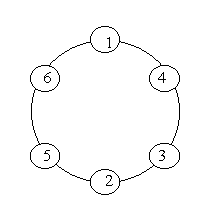HDOJ1016(标准dfs)
Prime Ring Problem
Time Limit: 4000/2000 MS (Java/Others) Memory Limit: 65536/32768 K (Java/Others)
Total Submission(s): 42688 Accepted Submission(s): 18919
Problem Description
A ring is compose of n circles as shown in diagram. Put natural number 1, 2, ..., n into each circle separately, and the sum of numbers in two adjacent circles should be a prime.
Note: the number of first circle should always be 1.
![]()
Note: the number of first circle should always be 1.

Input
n (0 < n < 20).
Output
The output format is shown as sample below. Each row represents a series of circle numbers in the ring beginning from 1 clockwisely and anticlockwisely. The order of numbers must satisfy the above requirements. Print solutions in lexicographical order.
You are to write a program that completes above process.
Print a blank line after each case.
You are to write a program that completes above process.
Print a blank line after each case.
Sample Input
6
8
Sample Output
Case 1:
1 4 3 2 5 6
1 6 5 2 3 4
Case 2:
1 2 3 8 5 6 7 4
1 2 5 8 3 4 7 6
1 4 7 6 5 8 3 2
1 6 7 4 3 8 5 2
#include <cstdio> #include <cstring> using namespace std; const int MAXN=25; int n,buf[MAXN],vis[MAXN]; bool isPrime(int x) { if(x<=1) return false; for(int i=2;i*i<=x;i++) { if(x%i==0) return false; } return true; } void dfs(int dep) { if(dep==n) { for(int i=0;i<dep-1;i++) { printf("%d ",buf[i]); } printf("%d\n",buf[dep-1]); return ; } for(int i=2;i<=n;i++) { if(!vis[i]&&isPrime(i+buf[dep-1])) { if(dep==n-1&&!isPrime(i+buf[0])) continue; vis[i]=1; buf[dep]=i; dfs(dep+1); vis[i]=0; } } } int main() { int cas=0; while(scanf("%d",&n)!=EOF) { memset(vis,0,sizeof(vis)); printf("Case %d:\n",++cas); buf[0]=1; dfs(1); printf("\n"); } return 0; }


 浙公网安备 33010602011771号
浙公网安备 33010602011771号